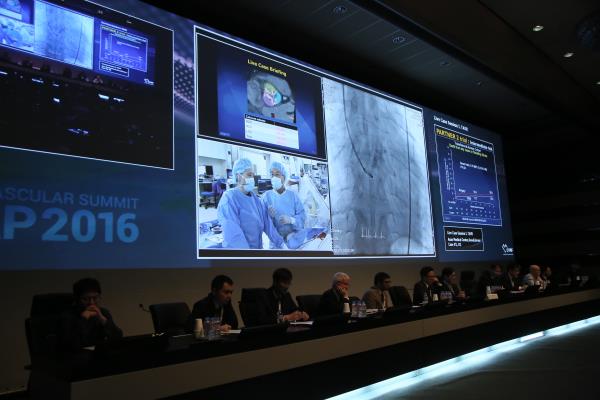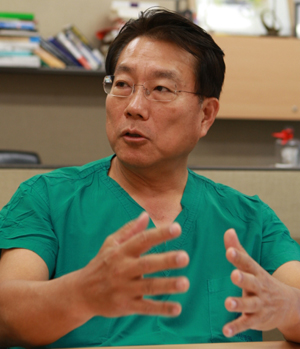‘AMC TCTAP’ becomes must-attend event for heart specialists
The “22nd CardioVascular Summit-TCTAP 2017” will open for a three-day run at Coex Convention Center in southern Seoul Tuesday. CardioVascular Research Foundation심장혈관연구재단(CVRF) hosts the annual event, and Asan Medical Center서울아산병원(AMC) organizes it.
In 1995, AMC held the first “Transcatheter Cardiovascular Therapeutics Asia Pacific” -- an academic conference that demonstrated the left (coronary) main trunk disease stent procedure -- which meets its 22nd anniversary this year. About 4,000 cardiovascular disorder specialists will take part in the event, with half of them coming from 50-odd foreign countries.

Three issues -- TAVI, BVS, and open occlusion
The TCTAP 2017 will deal with three major topics; Transcatheter Aortic Valve Implantation (TAVI) frequently performed these days, Bioresorbable Vascular Scaffold (BVS), and a surgical procedure to open clogged blood vessels.
The TAVI procedure is one of the hottest subjects now, in which AMC is taking the lead. BVS is also a surgical procedure doctors have frequently used since one-and-a-half years ago. If doctors insert a stent in a blood vessel, the iron is absorbed into the blood, different from the existing stent that leaves the metal in the vessel. There are still high concerns, however, because of its poor treatment records, including safety problems. AMC plans to make public its accumulated data, and discuss the future of BVS based on it during TCTAP 2017.
Also, the surgical procedure to open clogged blood vessels has become trendy among heart specialists, and AMC plans to show various methods related to it, hospital officials said.
TCTAP 2017 will deal with many other issues, such as percutaneous coronary intervention (PCI) and valves diseases treatment, carotid artery and abdominal aneurysm treatment, the percutaneous transluminal angioplasty procedure, cardiovascular images and physiology, drug eluting stent, bioresorbable scaffold, and structural heart disease.
Various live demonstration of procedures doctors must not miss
In the procedure session to be broadcast live, Korean and foreign hospitals with the global reputation for cardiology, such as Columbia University Hospital in the U.S., Saint Paul Hospital in Canada, San Raffaele Hospital in Italy, Fu Wai Hospital in China, and AMC, Seoul ST. Mary’s Hospital서울성모병원, Seoul National University Hospital서울대병원, and Severance Hoapital세브란스병원 in Korea will demonstrate live procedures.
On April 25, a one-day session will be held in cooperation with Asia-Pacific Chronic Total Occlusion club (AP CTO Club) to show a live procedure of Chronic Total Occlusion (CTO) intervention. Besides, the conference also handles partnership sessions with 12 foreign academies and associations, including those from the U.S., Japan, India, Indonesia, China, Thailand and Bangladesh, and a symposium about blood vessel treatment.
On April 26 and 27, symposiums each dealing with live procedures of coronary artery diseases and heart valves disease will proceed, and the in-depth discussion of noteworthy topics within the medical academy will be presented.
|
[Interview] Park Seung-jung, director of CVRF |
||
|
Park Seung-jung박승정, director of CardiVascular Research Foundation, the chief organizer of the conference, pointed to AMC’s matchless data and superior technique as the driving force behind its holding the conference for 22 consecutive years. He is very proud of the conference because he firmly believes TCTAP 2017 boasts higher quality than any other conferences held in the world with the same topic.
Question: ACM has held CardioVascular Summit-TCTAP for the 22nd year. How did it begin? Answer: Since 1993, AMC has conducted a stent procedure to cure left (coronary) main trunk disease treatment instead of performing surgery. And it could collect lots of related data because doctors at AMC had confidence in the procedure. We have held the conference with hopes to share the superiority of AMC and its data accumulated from numerous procedures. At the time, foreign experts were surprised to see the insertion of a stent to the left (coronary) main trunk, which made us want to show AMC’s uniqueness and related data. Finally, it has become known all over the world to expand the size of the conference, which has become a stage to discuss the up-to-date area of percutaneous coronary intervention (PCI). Q: It might not have been easy to hold the conference for more than two decades with the same topic of PCI. A: PCI has undergone biggest changes over the past 30 years. At first, we used balloons, followed by stents, and BVS has emerged now. To catch up with the changes, we have always needed to make new data and guidelines. These experiences alone can provide sufficient topics for the conference. Q: There are many similar academic held abroad. What’s unique about the AMC’s event? A: There are similar conferences held in the U.S. and Europe, but Korea is the leading country in the Asia-Pacific region. I have confidence our conference is better than those in America and Europe when it comes to the quality of the conference. And the main driving force behind the continued holding of this conference is abundant data AMC has accumulated independently. This is something we can be proud of, indeed. We have produced more than 500 papers based on the data over the past 20 years. Academic conferences, after all, are about collecting and sharing data, in which has made the unrivaled accomplishment. Q: About 4,000 people will attend this year’s conference, half of them from foreign countries. A: As we know, few conferences attract so many foreigners with a single subject. We have held it for more than 20 years and secured quite a number of regular participants in the process. This is because there are always contents they can learn here. Given the number of regular foreign participants, I think it has become an event that doctors doing PCI procedure must attend. Q: Where does Korea stand in the world when it comes to PCI procedure? A: AMC is in world’s top class. Not only does our hospital maintain high quality but it has an enormous quantity of data. I think Korea as a whole is maintaining above-average quality in the world as well. Q: This conference has lasted for more than 20 years. Aside from some burdensome feelings as its chief organizer, you might have some ambitions. A: I don’t feel any shortage of topics about it because this is an area that always changes. My ultimate worry is that so far, it has been important to gather people and show them something. From now on, however, such a method could become gradually dull. So we have to rack our brains to find out new ways of proceeding. |


